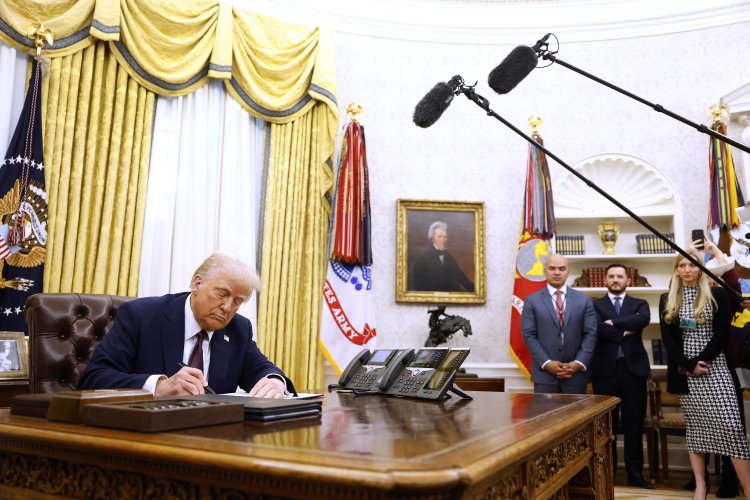Law students express preference for firms opposing Trump, they say
Law students are considering their career options, navigating choices between firms that have either yielded to Trump or are actively challenging him in legal battles.

As summer nears, law firms are ramping up their recruitment efforts on campuses, targeting first-year law students for future summer associate roles that may lead to full-time positions, often with starting salaries exceeding $200,000 post-graduation.
For many current law students, firms that have contested Trump’s executive orders in court or indicated support for those lawsuits have become more attractive than those that have struck agreements with the administration, according to insights from students, recruiters, and lawyers involved in recruiting efforts interviewed by PMG.
It's not only first-year students who are rethinking their summer work options. Some third-year students close to graduation, who have already accepted offers from firms that have complied with the president’s directives, are also reconsidering their situations, two recruitment insiders shared.
“I’ve never seen that happen,” remarked a partner at a firm actively challenging the executive order, who spoke anonymously to express candid thoughts on hiring trends.
Taking a stand for the legal profession and the rule of law has significantly elevated some firms’ visibility among students, observed Bryson Malcolm, a legal recruiter based in New York.
“Students aren’t really locked into every single law firm,” Malcolm said. “The firms who have lawyers who are actually proud to be there right now … I just think that’s going to come out when you’re talking to them and students might end up going for that.”
Since February, Trump has utilized executive orders to penalize law firms that have represented his political adversaries, sued his supporters, or employed his critics. So far, three firms—Perkins Coie, WilmerHale, and Jenner & Block—have legally challenged these orders and secured judicial rulings that have blocked provisions restricting their government contracts and their capacity to represent clients associated with the government.
Other targeted firms have opted to broker deals with the administration to avoid these economic penalties. These agreements involve firms committing up to $100 million in pro bono work toward the administration’s preferred initiatives and halting diversity, equity, and inclusion practices.
Students are closely monitoring firms' reactions, even maintaining a widely shared spreadsheet that tracks law firm actions.
“At a time where our judiciary and legal system as we know it are under attack, I think it’s more important than ever for these giants to use their voices and stand up to the bullies and preserve the integrity of our profession,” said one Georgetown Law student, who requested anonymity due to concerns about professional repercussions. “When people are under pressure their true selves emerge and we’ve certainly seen where the different priorities lie.”
Paul, Weiss was the first major firm to make such a deal in March, followed by Skadden Arps, Willkie Farr, and Milbank. None of these firms responded immediately to requests for comments, and other firms are reportedly in negotiations with the administration.
“We’re going to be close to a billion soon,” Trump aide Stephen Miller stated Wednesday as the president enacted a new executive order targeting firm Susman Godfrey. Susman has committed to challenging this order in court.
In addition to the three major firms actively defending themselves in court, law students are also favorably viewing those that have expressed support for these firms. Over 500 firms signed an amicus brief in the Perkins Coie lawsuit backing their counterparts and upholding the rule of law. Nonetheless, the brief was notably absent signatures from several notable industry leaders, with only 11 firms from the Vault 100—an esteemed ranking of law firms—choosing to sign. Of these, only Covington & Burling was among the top 20.
“When I’m talking to these law students and they’re asking what Covington thinks about this stuff, I can honestly and vociferously say we do not stand with the position that Paul, Weiss took or that any other firms that capitulated took,” an associate at Covington shared, requesting anonymity for candid discourse on recruitment.
Two Georgetown Law students, who asked for anonymity out of concern for professional retaliation, revealed they have adjusted their preferred firm lists to prioritize those that oppose the administration's orders.
When selecting firms for on-campus interviews next month, one student included Covington twice among her top five, allocating valuable interview slots to both its New York and Washington offices.
“It became more important to me to be at a firm that was doing the right thing even if that meant not necessarily being in precisely the location that I had initially wanted,” she explained.
“I want to be in a workplace where there is a diversity of experiences, of backgrounds, of cultures and that all those people would be supported in their work,” she continued. “Not to mention that we are lawyers and if you are not standing up for the rule of law then I’m not really sure what we’re doing.”
Firms that have taken a public stance against the administration's actions appear to be finding it easier to engage in open discussions with law school recruits. At a recent Georgetown Law affinity group recruitment event, representatives from firms that have remained silent faced challenges articulating their employers' positions on the executive orders, with one student noting they were “ignoring the elephant in the room.”
In contrast, a conversation with an associate at Perkins Coie earlier this week did not encounter similar issues, according to the student.
“Hearing the staff is united on this stuff and just hearing that unity and that commitment to preserving the values of the legal profession,” she said, “it’s what I came to school for and it’s just great to hear."
Max Fischer for TROIB News












